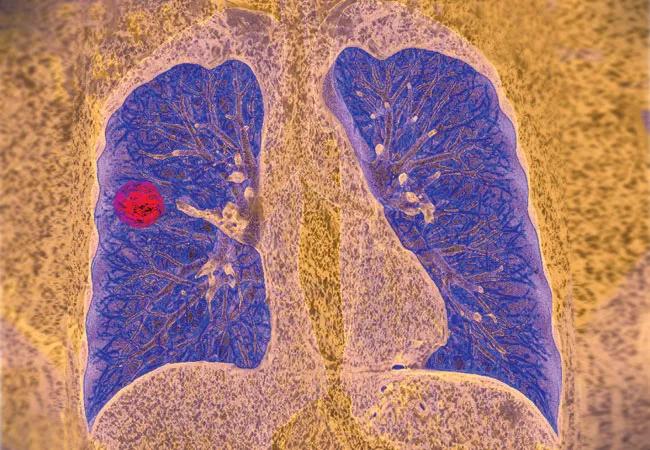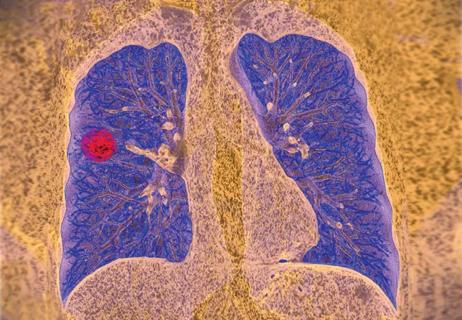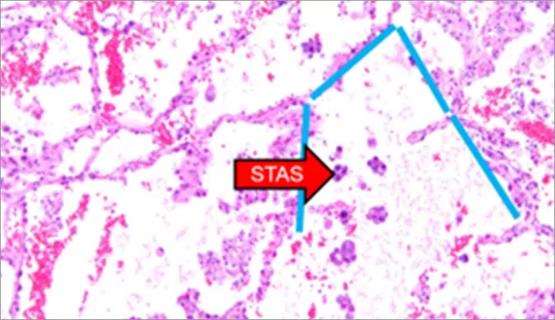Blood-based assay could alleviate barriers to lung cancer screening

Despite lung cancer screening being standard of care for those most likely to develop lung cancer, only 5-20% of patients move forward with the screening low-dose CAT scans. Of those patients, fewer than 40% continue on with annual scans. Researchers at Cleveland Clinic are hoping to change that, through a partnership with DELFI Diagnostics, who has developed a blood-based assay to screen for lung cancer.
Advertisement
Cleveland Clinic is a non-profit academic medical center. Advertising on our site helps support our mission. We do not endorse non-Cleveland Clinic products or services. Policy
The variability of DNA fragments in the blood of patients with lung cancer tends to be much more varied than in those who do not. Based on this principle of fragmentomics, the DELFI blood test uses machine learning to analyze DNA fragments and differentiate individuals with cancer from those without. “The hope is that having an easy-to-use, affordable blood test will help encourage more people to get their annual screenings done,” explains lead study author Peter Mazzone, MD, MPH, a pulmonary medicine specialist at Cleveland Clinic.
The primary objective of the DELFI-L101 study was to train and test a classifier to detect lung cancer. The first phase of the study included eligible participants age 50 or older who currently smoke or previously smoked and had a smoking history that exceeded 20 pack-years. This included 294 individuals with lung cancer and 661 individuals without lung cancer.
Blood samples were collected at enrollment in order to pursue analysis, including cfDNA isolation from plasma, low-coverage, whole-genome, next-generation sequencing and machine learning methods. Additional data, including medical histories, patient demographics, diagnosis as well as surgical, imaging and pathology reports were also collected at enrollment as well as 12 months afterwards.
The initial results of the blood assay, which were reported at the 2023 American Thoracic Society conference, demonstrated an ROC curve (measure of accuracy) of 0.81, which is accurate enough to be used in practice, noted Dr. Mazzone. Although further validation testing is needed to incorporate tests into standard practice, the training results suggest that the overall accuracy is potentially clinically useful.
Advertisement
“The measure of sensitivity for the test is quite high by design,” says Dr. Mazzone. “We want the test to be very sensitive. In some cases, it may come back with a positive result when there isn’t cancer present, but that’s ok because those patients will then get a low-dose CT scan, which is standard of care.”
The next phase of research will involve validating the results of the DELFI-L101 study. Researchers are prospectively enrolling 600 patients who are eligible for lung cancer screening to validate that the signal is accurate. Following that will be a nationwide, multi-center study of 15,000 patients to prospectively validate the accuracy of the assay developed in L101.
The hope is that the blood test can one day serve as a first step in screening for patients and increase the number of patients screened. Having a simple blood test available could drive up screening rates and increase early diagnosis – which is key as new therapies have emerged to treat the disease.
Having a blood test as the first step in screening could also minimize unnecessary tests for patients with lung nodules of indeterminate significance. “The majority of people who get a CAT scan are found to have lung nodules,” explains Dr. Mazzone. “Most of these are little scars that aren’t cancerous, but they often lead to further scans or invasive testing like biopsies. If the blood test can reduce how often patients need to get a CT scan, it will, by nature, minimize how often these nodules are found, thus avoiding extra testing for benign lung nodules.”
Advertisement
Advertisement

Treatment assigned FDA review date in June 2025

Cleveland Clinic, the University of Minnesota and University of Cambridge receive $1M grant to develop point-of-care biosensor for early detection and treatment personalization

Hybrid treatment model helps improve cancer care access

Resection, radiotherapy or ablation?

Extent of baseline burden impacts progression-free and overall survival

Quantum computing being studied as a means to help improve predictive performance, accuracy

Young age, solid tumor, high uptake on PET and KRAS mutation signal risk, suggest need for lobectomy

Targeting DNMT1 shows promise in chemotherapy- and immunotherapy-resistant SCLC